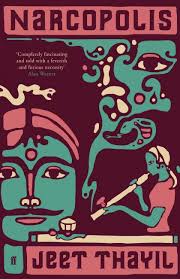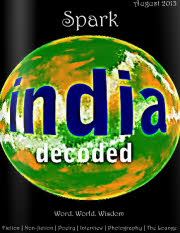by Kalpanaa Misra
Jeet Thayil’s Narcopolis is certainly illuminating as well as luminous with the power of its magnificent prose, says Kalpanaa Misra, in her review of the book and adds that it is a must-read.
Any fleeting desires I may have had to be an opium addict have been fulfilled after reading Jeet Thayil’s Narcopolis. This isn’t a joke. The author’s in-depth portrayal of drug dens in the dark underbelly of Bombay makes the book worth a read if only to get into the life and mind of an opium junkie. After all, there is no experience that is without benefit. And not many of us can take time out of our lives to get addicted to opium and heroin and then de-addict ourselves.
That isn’t the only reason why I recommend reading Narcopolis . Google books calls it “Jeet Thayil’s luminous debut novel” and it certainly is illuminating as well as luminous with the power of its magnificent prose. Thayil was the first Indian writer to win the DSC prize for South Asian Literature. The chair of judges for the 2013 prize, the poet K Satchidandan, said the winning novel dealt with the complexities of globalisation and the modern world “with extreme verbal artistry and lyrical intensity”. Beautiful prose is the least you would expect from a poet, you might say. But not all poets make the transition from poetry to prose well. Thayil does. While reading the book, I often lost myself in the sheer pleasure of his words. One tends to miss some important revelations because one was admiring the author’s artistry – his marvelous way with words. The plot is wistful and wispy – one that floats away like a puff of opium-flavoured smoke only to return with the hard crack of a cocaine hit.
The first sentence of the book is four pages long. It’s necessary to read the first sentence in one sitting. You can’t really come back to it later without starting again from the beginning. I didn’t read the book at a stretch. I’d take breaks from it – breaks dictated by the structure of the book. It’s difficult to read it like a novel – with its juxtaposition of obscure details of the character’s lives, with very important points. You don’t know which is which and sometimes you forget things that have been written down – things that are vital to the plot. Perhaps that’s what an opium high is like – unnecessary attention to pointless detail while the larger picture passes you by. Well in any case, life is like that. And here is a quote from the book that will make you think deeply and in the process distract you from the story. “Dreams leak from head to head, they travel between those who share the dreams of intoxication and death.”
The coolness of death, drugs and the seamier side of the Bombay of the 70’s is very real and probably still a part of the Mumbai of the second decade of the 21st century. Tales of pimps and whores and the exploitation of hijras by everyone. The spark of hope kept alive and the lack of a despair you would expect in a story about addicts are fascinating. There’s hardly any sense of fate or depression because the addicts are happy with their choice, the characters enjoy the kick of the drug and have no regrets or desire to be anything other than addicts – admirable single-mindedness if it weren’t so destructive. In the midst of days of hardened criminal activity, you’re surprised by a character’s appreciation of the simpler pleasures of life – whether it’s a milkshake or a walk along the beach. And so the characters grow on you – Dimple and Rashid for sure – you learn to suspend judgment. Towards the end of the book you realise why there was one character whom you just couldn’t understand or forgive, and you knew you had drawn the line between terrible crime and petty crime.
You will enjoy the conjuring up of an India of 40 years ago. Look out for the references to the Hindi film industry and small news items that shocked the country and were the stuff of our nightmares at the time – the random stone killer who targeted people who slept on the streets, among others.
Do read Jeet Thayil’s Narcopolis, for it has been called, “A fabulous story, incredibly told.” And it is.
Kalpanaa Misra is a writer. She blogs at http://kalpanawrites.blogspot.in. Her twitter handle is @kalpanapster.
Kalpanaa Misra is a writer. She blogs at http://kalpanawrites.blogspot.in. Her twitter handle is @kalpanapster.






